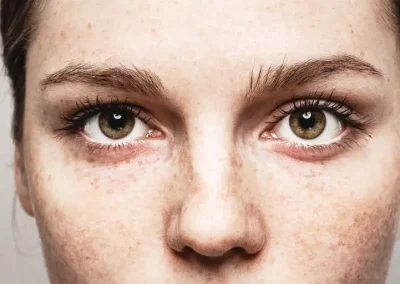How to Be More Creative: Managing Your Screen Time at Night to Increase Creativity
Everyone has experienced the effects of a bad night of sleep—you wake up on the wrong side of the bed feeling cranky, irritable and longing for rest. You don’t want to face the day and you’re definitely not feeling creative. Why does a lack of sleep affect us so much, how does it impact our creativity and what can we do about it? It all comes down to REM sleep and blue light.
First, REM Sleep: What Is It?
You may have heard about REM sleep, but you might not know exactly what it is or why it’s so important for your health and well-being. REM sleep typically occurs around 90 minutes after you fall asleep. It’s called REM because your eyes move rapidly back and forth—it stands for ”rapid eye movement”—and it’s the phase of sleep when dreaming takes place. Your body is temporarily paralyzed during REM so that you don’t actively act out your dreams (and fall out of bed or injure yourself).
You continuously cycle through three non-REM stages of sleep every night, followed by a period of REM sleep where you experience vivid dreams (even if you don’t remember them). You normally spend around 10 minutes in the first REM period, with the amount of time increasing as the night goes by. If you don’t sleep well or your sleep is interrupted, you’re probably not getting enough REM sleep. Babies spend half of their typical 16 hours of sleep in the REM phase, but as people age, they naturally spend less time in REM sleep. And it’s not just aging that has an impact on REM sleep—it’s also affected by our connected lifestyles and screen time.
How a Lack of REM Sleep Impairs Creativity
We’ve all pulled all-nighters at some point in our lives, but as you’ve probably noticed the day after, a lack of sleep is not the key to creativity. In order to be creative, you need sufficient REM sleep. Why? For one, REM sleep plays a role in removing toxins that build up in the brain during the day that affect proper brain functioning, especially in the area of executive functioning (which includes working memory, control and the ability to think outside the box, all skills that are needed for creativity). As a paper published in the journal MEDtube Science explains, “Essentially, sleeping acts as a garbage collector that comes during the night and removes the waste product left by the brain.”
Another reason REM sleep is so important is because it’s the time when your brain comes up with new ideas, makes novel associations, and forms new connections.
REM sleep and creativity: learn to dream
In order to think creatively, it’s important to be able to build on existing knowledge. To put it simply, if you don’t allow your brain adequate time to integrate and process what you’ve already learned, you won’t be able to come up with anything new.
All stages of sleep are important for creativity because, in the words of a study published in Trends in Cognitive Sciences, they help “boost the formation of complex knowledge frameworks,” help restructure these frameworks, and therefore help promote creative thought. REM sleep in particular is important for creativity because it helps you consolidate the events of the day and process emotions and memories, which is crucial for learning and higher-level thinking. As one study published in the Proceedings of the National Academy of Sciences of the United States of America, points out, “REM enhances the integration of unassociated information for creative problem solving;” the researchers state that “the role of REM sleep in creative problem-solving underscores Nobel Laureate Friedrich A. Kekule’s recommendation: ‘Let us learn to dream.’”
The Impact of Screen Time on Sleep
Until we started using artificial light, our bodies were more in sync with natural rhythms of light and darkness. We slept when it was dark, and we woke up with the sun. But our rhythms have increasingly been (negatively) impacted since artificial blue light entered the scene. Nowadays, especially with the advent of devices that emit blue light, and with most of us spending more time in the evening on those devices, it’s important to understand the particular impact that nighttime exposure to blue light can have on your sleep.
How blue light affects your circadian rhythm—and why it matters
Your circadian rhythm is the time-dependent bodily process that controls a variety of functions, including your sleep-wake cycle. Everyone’s circadian rhythm is slightly different, with night owls having a somewhat longer rhythm and early birds having a slightly shorter one, but all of these rhythms are affected by light. When it gets dark, the part of the brain known as the suprachiasmatic nucleus signals the release of the sleep hormone melatonin, which helps you feel sleepy at night and lets you know that it’s time to go to bed. Evening exposure to blue light throws a wrench into this entire process.
As a recent study in the Journal of Biophotonics puts it, “chronic exposure to low-intensity blue light directly before bedtime may have serious implications on sleep quality, circadian phase and cycle duration.” The same study explains that “blue light is currently considered to have the strongest effect in synchronizing human circadian rhythm … [and] exposure to low levels of blue light before bed time may disrupt the circadian rhythm with severe general health implications.” You can imagine how reading a book on your tablet in bed or playing a game on your phone to unwind might actually be setting the stage for a bad night of sleep, which, in addition to the negative health implications, can also seriously affect your creativity and cognition.
What You Can Do About It
Limiting your exposure to and protecting your eyes from blue light are the most logical and practical proactive steps you can take to get a better night’s sleep (and thereby help improve your creative abilities). How can you do this? Turn screen lights down and give yourself a minimum two-hour window of no screen time at night before bedtime. Find alternative activities to help you wind down at night—consider reading a paperback book instead of reading from your tablet, listen to some music on speakers or practice meditation. If these aren’t feasible options for you, then wear yellow blue-light blocking glasses at night (they have to be dark yellow, like amber, to absorb blue light and have a protective effect on your circadian rhythm).
Recognizing the problem is the first step toward positive change. If we can acknowledge the detrimental impact of blue light on sleep and really understand the ways it affects us, we are empowered to take action to counteract its effects and take charge of our well-being and health.
Sources:
National Institute of Neurological Disorders and Stroke – Brain Basics: Understanding Sleep
Children’s Hospital of Philadelphia – Newborn-Sleep Patterns
Medtube Science – “The Neuroprotective Aspects of Sleep”
Trends in Cognitive Science – “How Memory Replay in Sleep Boosts Creative Problem-Solving”
Science Direct – How Memory Replay in Sleep Boosts Creative Problem-Solving
Proceedings of the National Academy of Sciences of the United States of America – “REM, not incubation, improves creativity by priming associative networks”
Sleep Foundation – Circadian Rhythm
Journal of Biophotonics – “The inner clock-Blue light sets the human rhythm”
Chronobiology International – “Amber lenses to block blue light and improve sleep: a randomized trial”



